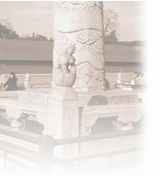| Foreign Ministry Spokesperson's Press Conference on June 19, 2003 |
| 2004-06-12 17:11 |
|
On 19 June Foreign Ministry Spokesperson Liu Jianchao held a regular press conference. Liu Jianchao: Good afternoon everybody. I’ll begin with an announcement. At the invitation of Foreign Minister Li Zhaoxin, Foreign Minister Bill Graham will visit China from June 22nd to 24th. Q: The US President Bush criticized Iran for its nuclear program. What’s China’s comment on that? A: The position of China on nuclear weapons has been consistent. We are opposed to the proliferation of weapons of mass destruction, nuclear weapons included. There’ve been quite a lot of speculations about Iran’s nuclear program. Chinese Government supports the additional protocol of IAEA with a view to enhancing the existing safeguarding and monitoring system. China signed the protocol in December 1998 and completed relevant legal procedures required by domestic law to validate it last March. China is the first among the five nuclear states to ratify the protocol and hopes that other countries can sign and ratify the protocol at an early date. In the meantime, we maintain that nonproliferation should not be a hurdle to the peaceful use of related technologies. It’s our hope that the ongoing board meetings of IAEA will help to get some clarity of the nuclear plans and related nuclear cooperation of Iran. Q: It’s been widely reported that during his meeting with the Japanese and ROK Foreign Ministers, Foreign Minister Li Zhaoxin agreed to expand the tripartite talks in Beijing to multilateral talks where R.O.K. and Japan can participate. He also promised that China would try its best to pull DPRK back to the negotiating table. Can you confirm this? A: Foreign Ministers of China, Japan and R.O.K. talked about the Korean nuclear issue and expressed their positions respectively when they held talks the day before yesterday. The other two expressed appreciation of the role of China in making the Beijing Talks a reality. And it’s agreed by the three to continue the process of Beijing Talks. At present the shared goal of the international community is to ensure a nuclear-free Korean Peninsula, which enjoys peace and stability. Beijing Talks are a sound start to address the nuclear issue peacefully through dialogue. It’s the universal hope of the international community to continue the process. It’s also a shared belief. China has always kept contact with relevant countries, hoping that relevant countries can adopt a flexible and practical attitude to continue the process. China doesn’t wish to see the process hampered by different views about the formality. Neither does it wish to see the goal of ensuring a nuclear-free, peaceful and stable Korean Peninsula affected by disagreement on formality. Q: Two questions about the visit by Prime Minister Vajpayee. First, there are only a few days to go before the visit starts. But who will meet with him, when and some other details of his schedule still seem to be under discussion. Given the transparency of the diplomacy of China, can you disclose here whom will he meet with during the visit? My second question relates to the border issues between China and India. I understand that the two have exchanged maps of the middle section of the border. Can you tell us the situation in the eastern and western part along the border and the nature of the disputes between China and India? A: Spokespersons of the Foreign Ministry have been trying our best to update you diplomatically, including the schedule of Prime Minister Vajpayee’s visit to China. Premier Wen Jiabao will hold talks with him. As our usual practice, other state leaders will also meet with him. This matter is irrelevant to transparency. We’ll release relevant news in due course after the meetings. The question concerning border issues is a very technical matter and it takes more than on occasion like this to elucidate. This morning, deputy director-general of the Department of Asian Affairs of the Ministry briefed us on the related issue. China believes that the two sides can find a fair and reasonable solution to the border issues so long as we follow the principles of “negotiation on an equal footing, mutual understanding and accommodation, and mutual readjustment”. Q: One more question about the visit by Prime Minister Vajpayee. How many countries does China know refuse to recognize Sikkim as part of India? A: You’d better refer the question to relevant countries. China and India are having and will continue to have helpful discussions on that. Q: Are the two sides going to discuss the closer military exchanges between India and Israel during the visit? Does China believe their military exchanges conducive to peace and stability of the region? A: We have always endorsed the development of relations among states in various fields in light of the five principles of peaceful coexistence. China also wishes to see India and Israel develop their friendly relations and cooperation in all fields, hoping that the cooperation conforms to peace, stability and development of the region. Q: About SARS. How many countries does the Foreign Ministry know still have travel restrictions upon China? A: We have released related information on the website of the Ministry very recently. My colleagues have also updated you here. There are some countries taking travel restrictions on Chinese citizens because of the outbreak of SARS in China. With the relaxation of the epidemic, some countries have eased or lifted the restrictions. Things change very swiftly and it’s not easy to collect all the statistics. But I can tell you that as some countries still have travel restrictions, many are relaxing or lifting the restrictions. There are also countries that have never adopted restrictions from the very beginning. |
|
||||||||||
 |
||||||||||
|
| ||||||||||
|
| ||||||||||
 | ||||||||||
 | ||||||||||
 |
| Home > News | |||
|
|
|||
|
| |||